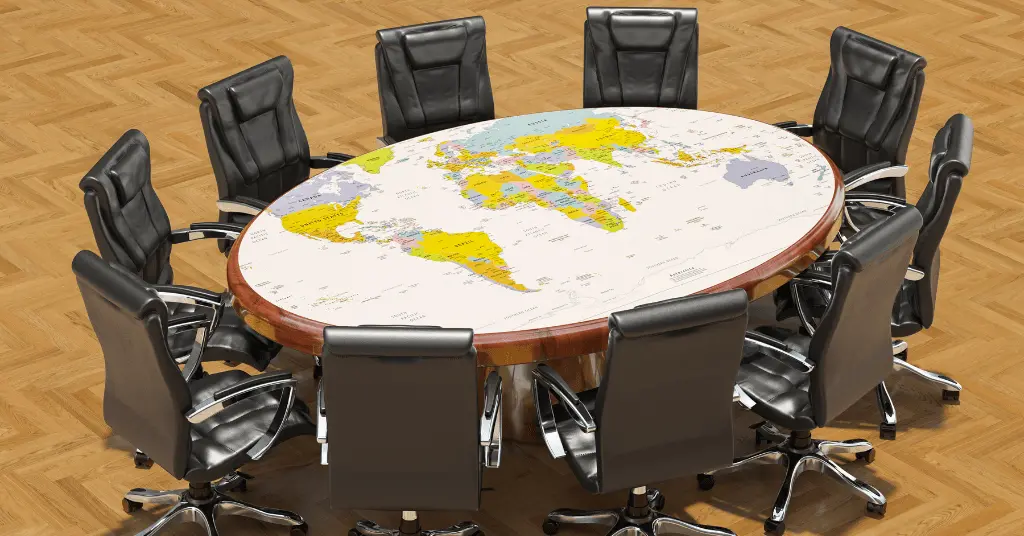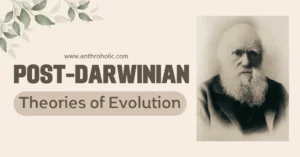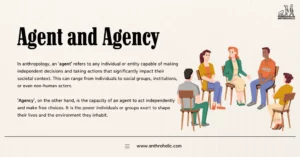AI Answer Evaluation Platform Live Now. Try Free Answer Evaluation Now
Political Anthropology
Political Anthropology examines the socio-cultural processes within governments, states, parties and other political systems. It includes the critical study of various facets of politics like power, social control, authority, freedom and equality. Anthropologists have indulged in both, the comparative as well as descriptive analysis of political spheres within primitive and urban societies.

The discipline is a subfield of social anthropology and views societies from a political perspective. In fact Georges Balandier, in his book Political Anthropology (1970), has regarded humankind as homo politicus with a natural political inclination. Perhaps one can say that a political anthropologist is chiefly involved in analysing and measuring how much this inclination occurs in different social settings.[1]
Origin of Political Anthropology
Political analysis of societies had its early footing in the philosophical work of European thinkers like Montesquie. However, the 19th century initiated a new generation of social scientists and thinkers with a more sociological approach in understanding political organisations. Emile Durkheim, Max Weber and other European thinkers attempted to understand the politics of societies outside of their own. This laid the foundation for political anthropology of primitive and archaic societies.
In some sense, Engels and Marx have also been credited for throwing light on formation of social classes in political contexts of post-primitive societies, particularly rural villages in British India.
Development of Political Anthropology
Franz Boas first devoted a chapter in his General Anthropology (1938) to address governmental problems. The following years marked the rise in ethnography and fieldwork which consequently birthed the concept of political ethnography. In 1940, Evans-Pritchard worked with the Nuer in Africa and detailed their political relations in light of kinship as well as their non-governmental system.
Objectives of Political Anthropology
African Political Systems was published in 1940 by Evans-Pritchard and Meyer Fortes which revolutionised political anthropology and paved way for understanding the following [2]
- How peace, order and cohesion remain intact in social settings
- Forms of power, politics, authority and government (structural-functionalism).
- The nature of state institutions.
- How political structures are classified taxonomically based on their economic, judicial and administrative systems.
- How ordinary organisations like marital bonds, kinship ties and rituals interact with political systems.
This seminal work ushered in a rapid rise concerning political anthropology. The publication of Political Systems of Highland Burma (1954) by Edmund Leach highlighted distribution of power and the impetus that authority has in influencing social change. [1] In 1962, Elman Service published the book Primitive Social Organization and classified various evolutionary stages of humankind into different political categories like bands, tribes, chiefdoms and states. Which broadened the scope of political anthropology in studying hunter-gatherer tribes.
Latest Trends in Political Anthropology
Post-structuralism
In light of dispersed anthropological interests, the 1960s and 70s saw French anthropology distancing itself from Eurocentric and colonial-era interpretations[3]. Georges Balandier and Pierre Bourdieu pioneered these works largely focusing on inequality and class domination within different societies. [4]
In the 1980s, Michel Foucault inspired political anthropology to focus on governmentality, bureaucracy and sovereignty which became central to investigating the nature of social control and coercion in forms of societies. This period also saw political anthropology merging with other domains like philosophy, economics and political science.[5]
Changing Perspectives
In the mid-80s concepts of post-colonialism, postmodernism and feminism were beginning to gain a stronghold on social sciences. In political anthropology, efforts were being made to understand symbolism and nationalism in politics. Bruce Kapferer’s Legends of People, Myths of State (1988) and Anthony D. Smith’s Nationalism (1994) among others explored such ideological frameworks.
The rise and appeal for equal treatment of women inspired works like Woman, Culture and Society (1974)[6] and in many ways anthropologically viewed women within the contexts of culture and politics.
Political anthropology in this period also addressed the East-West dichotomy, wherein the political imperatives of anthropological research made during imperialism and colonialism were criticised. Edward Said’s Orientalism (1978) spoke to the unequal power relations between the east and west. Africa and other non-western regions suffered from prejudice following decades of enforced domination and ethnocentric interpretation. These themes were explored by Achille Mbembe in Postcolony (2001).[7]
Trajectories of Political Anthropology
- The State and its settlement hierarchies, bureaucracy, governance and infrastructure with relation to its demography. [8]
- Governments and its types viz. Democracy, Oligarchy, Authoritarian etc.
- Citizenship as an interdependency between individuals and the state.
- Power/Authority and its socio-cultural influence.
- Social Movements as collective action and change in politics or policies.
- Policies and Bureaucracy
- Nationalism and its symbolic influence on cultures.
- Marginal Communities and Inequality in the political sphere.
Conclusion
Political anthropology can be categorised as the study of the ‘political life of humans’. Its early stages were marked by theoretical themes from economics and sociology. In hindsight, the development of the field took place to scrutinise the broad socio-cultural aspects of politics. The discipline has evolved in accordance with the political atmospheres of the world, right from colonialism to Marxism to the World Wars and recently the age of violence and terrorism. In a way, this evolution highlights the broad scope of the domain to include a host of different cultures, societies, religions and countries in its case study of political systems.
Frequently Asked Questions
See Also
References
[1] Balandier, G. (1970). Political anthropology. Pantheon Books.
[2] Krohn-Hansen, Christian (2015). International Encyclopedia of the Social & Behavioral Sciences || Political Anthropology. , (), 335–341. doi:10.1016/B978-0-08-097086-8.12131-2
[3] Greenhouse, C.J. (2018) Political anthropology. In H. Callan (ed) The International Encyclopedia of Anthropology (pp. 1–15) . Chichester, UK: Wiley-Blackwell.
[4] Bourdieu, P. (1977). Outline of a Theory of Practice (R. Nice, Trans.). Cambridge University Press.
[5] Lewellen, T.C. (1983) Political Anthropology: An Introduction. Amherst, MA: Bergin and Garvey.
[6] Bamberger, J. (1974). Woman, culture, and society. United States: Stanford University Press.
[7] Koster, Martijn. (2021). Political Anthropology. 10.4135/9781529756449.n19.
[8] Sandeford, David S. (2018). “Organizational complexity and demographic scale in primary state”. Royal Society Open Science. 5 (5): 171137. doi:10.1098/rsos.171137. Fried, M. H. (1967). The Evolution of Political Society: An Essay in Political Anthropology. McGraw-Hill. https://pubmed.ncbi.nlm.nih.gov/29892345/




